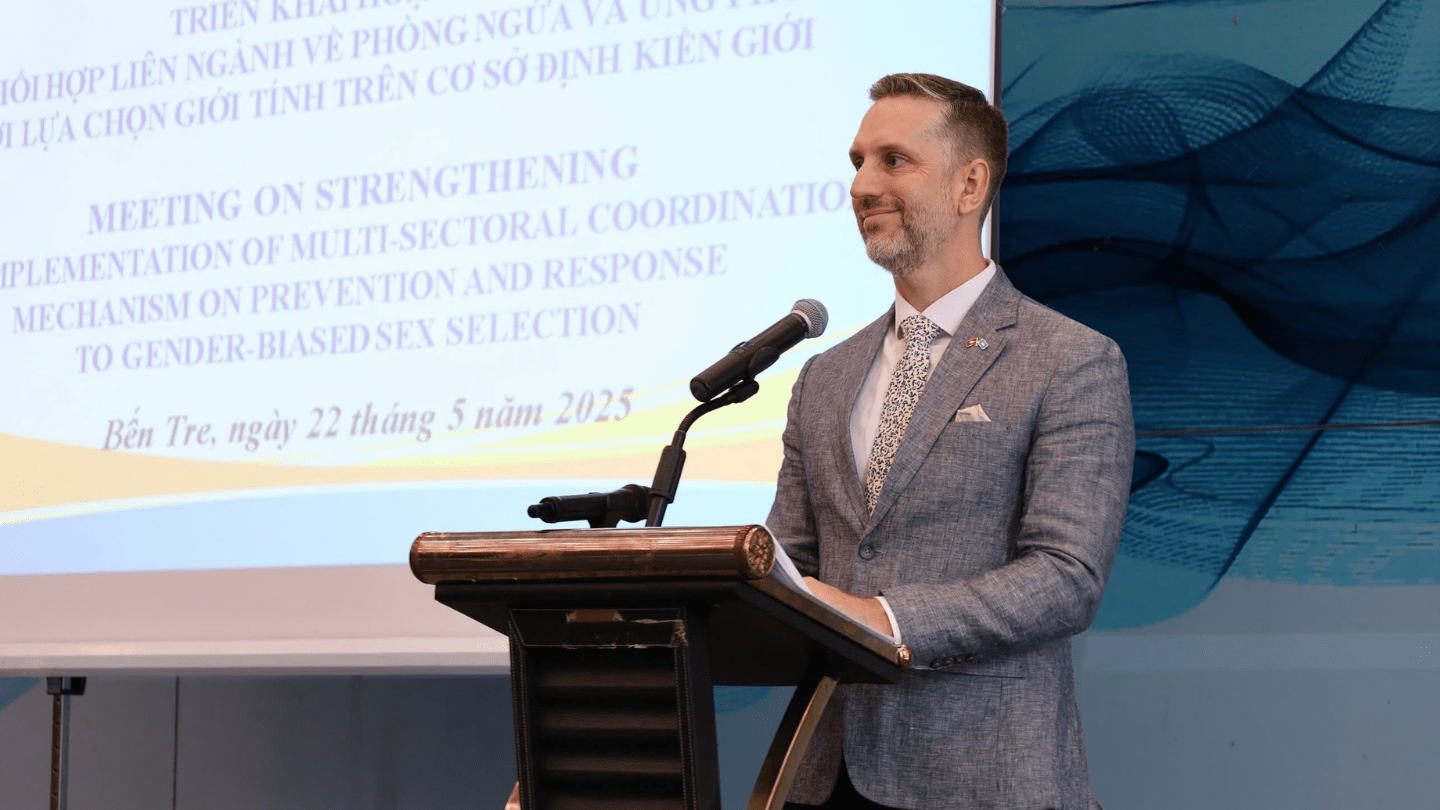Speech by Mr. Matt Jackson, UNFPA Representative in Viet Nam
Meeting with Ben Tre Provincial Leaders and Viet Nam Population Authority
Ben Tre Province, 22 May 2025
Leaders of the Viet Nam Population Authority,
Colleagues from the Department of Health of Ben Tre,
Ambassador of Norway, Hilde Solbakken
Representatives of civil society and local agencies,
Thank you for welcoming us so warmly to Ben Tre Province today.
It is always a privilege to visit this resilient and dynamic region, whose people continue to demonstrate a deep commitment to equity and social progress. Today, we are here with a shared mission — to advance gender equality by preventing and responding to gender-biased sex selection, or GBSS.
At its core, GBSS is a violation of fundamental human rights. It reflects an entrenched undervaluing of girls and perpetuates a cycle of discrimination, disempowerment, and lost potential. Viet Nam is among the highest three countries with an abnormal difference in the sex ratio at birth, with 111.5 boys for every 100 girls. This imbalance has long-term implications for women and girls, and also for their families and communities. In addition to the inequalities inherent in this harmful practice, the preference for sons also creates demographic challenges.
UNFPA is proud to stand beside the Government of Viet Nam, provincial leaders and local champions in tackling this challenge. Our partnership with the Viet Nam Population Authority (VNPA) is grounded in evidence, innovation and a shared determination to shift harmful norms.
Together, we are making progress. From 2017 to 2019, with support from the European Union, UNFPA worked with VNPA, CSAGA, and the Viet Nam Farmers’ Union to implement the Global Programme to Prevent Son Preference and the Undervaluing of Girls - implemented in Bangladesh, Nepal, and Viet Nam - UNFPA has worked closely with national and provincial partners to address the root causes of GBSS.
In Viet Nam, Phase I (2017–2019), funded by the European Union, was implemented at the central level in collaboration with VNPA, MOLISA, the Viet Nam Farmers’ Union, and CSAGA.
Building on this foundation, Phase II (2020–2022) focused on strengthening community-based solutions in Bac Giang and Ba Ria–Vung Tau provinces. This was generously supported by the Norwegian Agency for Development Cooperation (Norad), who provided a total programme budget of NOK 30.3 million. Of this, USD 388,000 was allocated directly to activities in Viet Nam over three years — a contribution that played a vital role in advancing local engagement and promoting the value of girls within communities.
In recognition of this partnership, we are joined today by a key advocate and friend of Viet Nam, Ambassador Hilde Solbakken of Norway, whose country has been a global leader and generous supporter of efforts to eliminate harmful practices, including GBSS.
The results of this second phase underscore the importance of strong community partnerships, including:
- A multi-sectoral coordination mechanism was successfully piloted in Bac Giang province, laying the foundation for national replication to address GBSS.
- 9 Responsible Father Clubs were set up in Bac Giang and Ba Ria–Vung Tau with 265 members, 75% of whom were men, promoting positive fatherhood and gender equality.
- Over 100+ community communication sessions, reaching over 4,000 residents to raise awareness on GBSS, son preference, and gender equality.
- Indeed, public awareness significantly increased: the Endline study shows 80.7% awareness of GBSS-related communications — an increase of nearly 65% (64.7%) from baseline levels.
- These results demonstrate strong community engagement to challenge and shift social norms through outreach and inclusive dialogue.
Now, here in Ben Tre province, we take this momentum forward. Through collaboration with VNPA and with the leadership of provincial partners, we are supporting the local adaptation of a multi-sectoral coordination mechanism — a model designed to bring together health, education, justice, and civil society actors in a unified, effective response to GBSS.
This approach goes beyond service provision. It includes:
- Strengthening data systems to monitor SRB trends,
- Training health workers on ethical counselling and gender-sensitive practices,
- Raising public awareness to transform social norms,
- And building referral systems that ensure every woman and girl receives dignified, timely, and quality support.
I want to underline that this initiative in Ben Tre is a promise for the future.
A promise that every child, regardless of gender, will be welcomed with equal joy.
A promise that every woman will be able to make informed choices about her body and her future.
A promise that no girl will be invisible.
A promise that no girl will be missing simply because she is a girl — a promise to cherish her worth, protect her rights, and ensure she is seen, heard, and empowered at every stage of life.
On behalf of the delegation, I thank the Ben Tre Provincial People’s Committee and the Department of Health for your unwavering support and leadership. With your commitment, the results from Ben Tre will help to further shape national guidelines and catalyse scale-up across Viet Nam.
What we’re doing together is building a future where every girl is valued, where everyone can make informed decisions of their own bodily autonomy, and where every son and daughter has equal opportunity to fulfil their potential.
Thank you. Xin cảm ơn./


